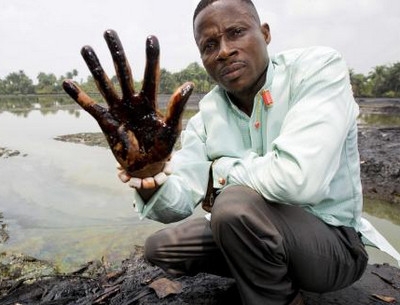
A new report – commissioned by a coalition of eight civil society organisations – shows how a future UN treaty on Business and Human Rights could improve access to remedy for victims of business related human rights abuses. Five well-documented cases of corporate abuse that played out in European courts were analysed – from oil pollution by Shell in Nigeria to waste dumping by Trafigura in Côte d’Ivoire. From these cases, seven recommendations are made for Treaty elements that would improve access to remedy for victims, in advance of the Treaty negotiations that are coming up in October this year.
Remedy is rare
For victims of business-related human rights abuse or environmental damage, access to justice is hard to get. Examples of human rights abuses by multinationals include land rights violations, forced labour, lack of protection for workers and local people from hazardous substances, as well as poor safety standards. These international businesses remain largely outside the formal regulatory system of human rights law.
But there is hope for the victims. In June 2014, a ground-breaking resolution was adopted by the Human Rights Council that established an Inter-Governmental Working Group to develop an ‘international legally binding instrument on transnational corporations and other business enterprises with respect to human rights’. Mariëtte van Huijstee (SOMO): “Such a binding instrument, or Treaty, has real potential to bring about change. It represents an opportunity to coordinate and scale-up policies and legal developments at the domestic level. Europe can play an important role in this process”.
Breaking through barriers
The report gives a substantiated and well-documented answer on how a UN Treaty can improve access to remedy, and was commissioned by a coalition consisting of: ActionAid Netherlands, Brot für die Welt, Centre for Research on Multinational Corporations (SOMO), CIDSE, Friends of the Earth Europe, International Trade Union Confederation (ITUC), International Transport Workers’ Federation (ITF), the Norwegian ForUM for Development and Environment (ForUM). The organisations are associated with the Treaty Alliance and active in Europe, and seek to inform the upcoming negotiations in the UN.
The author – Daniel Blackburn (Director of the International Centre for Trade Union Rights) – selected five well-documented cases of litigation that played out partly in European courts. He then analysed – from a victim’s point of view – the barriers they faced in accessing remedy for the abuses they have suffered. He went on to analyse the existing and potential policy approaches designed to address these barriers, thereby identifying elements that could be built upon by a Treaty.
Recommendations in a nutshell
In the report seven areas of reform are identified and explained in more detail. These include:
- Use the Treaty to make it easier to overcome jurisdiction barriers;
- Use the Treaty to remove legal barriers to corporate liability and to place upon corporations a broad duty of care;
- Use the Treaty to promote convergence of criminal law around basic modern approaches to corporate liability;
- Use the Treaty to improve corporate responsibility by giving binding legal force to the due diligence framework from the UNGPs;
- Use the Treaty to affirm and extend protection for human rights defenders;
- Use the Treaty to improve access to courts;
- Use the Treaty to improve effectiveness of State enforcement.
Links to:
– Full study
– Executive summary
– Recommendations
Contact person: Denise Auclair, Senior Policy Advisor (auclair(at)cidse.org)
